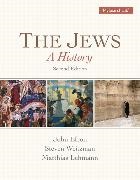Read more
New research has conspired to unsettle many established ideas about the Jewish past, challenging how historians have thought about and described it. This book welcomes such developments, as it provides the opportunity to study a wider range of people than before: among them mothers, children, workers, students, artists, and radicals.
List of contents
Chapter 1: Ancient Israel and other Ancestors
Chapter 2: Becoming the People of the Book
Chapter 3: Jews and Greeks, Jews in Greek
Chapter 4: Between Caesar and God
Chapter 5: Rabbinic Revelations
Chapter 6: Under the Crescent
Chapter 7: Under the Cross
Chapter 8: A Jewish Renaissance
Chapter 9: New Worlds, East and West
Chapter 10: The State of the Jews, Jews and the State
Chapter 11: Modern Transformations
Chapter 12: The Politics of Being Jewish
Chapter 13: A World Upended
Chapter 14: The Holocaust
Chapter 15: Difficult Freedoms
About the author
John M. Efron is the Koret Professor of Jewish History in the Department of History and Director of the Institute for European Studies at the University of California, Berkeley. Professor Efron's research focuses on the German-Jewish engagement with medicine, anthropology, and anti-Semitism. He has also written on Jewish political and popular culture in Central Europe, on Yiddish political satire in Poland and Israel, and on the role of sport in the modern Jewish experience. He is author of Medicine and the German Jews: A History (2001); and Defenders of the Race: Jewish Doctors and Race Science in Fin-de-Siecle Europe (1994). He is coauthor of The Jews: A History (2012). He is currently at work on a new book that will explore modern German Jewry's attraction to the aesthetics of medieval Sephardic Jewry.
Steven Weitzman is the Daniel E. Koshland Professor of Jewish Culture and Religion at Stanford University and director of its Jewish Studies program. Trained at Harvard University, Weitzman is a scholar of biblical and early Jewish literature, seeking through his research to illuminate the beginnings of Jewish culture and how ancient texts like the Dead Sea Scrolls relate to the contexts that produced them. His other publications include Surviving Sacrilege (Harvard) and Solomon: the Lure of Wisdom (Yale).
Matthias B. Lehmann is a historian of early modern and modern Jewish history, with a special interest in the history of the Spanish Jews and the Judeo-Spanish diaspora in the Mediterranean. He teaches at the University of California, Irvine, where he holds the Teller Family Chair in Jewish history. After studying in Freiburg and Berlin, Germany, as well as the Hebrew University of Jerusalem and the Consejo Superior de Investigaciones Cientificas in Madrid, Spain, he earned his Ph.D. from the Free University of Berlin in 2002. He is the author of a book entitled Ladino Rabbinic Literature and Ottoman Sephardic Culture (Indiana University Press, 2005), as well as Emissaries from the Holy Land (forthcoming from Stanford University Press).
Summary
The Jews: A History, second edition, explores the religious, cultural, social, and economic diversity of the Jewish people and their faith. The latest edition incorporates new research and includes a broader spectrum of people - mothers, children, workers, students, artists, and radicals - whose perspectives greatly expand the story of Jewish life.

